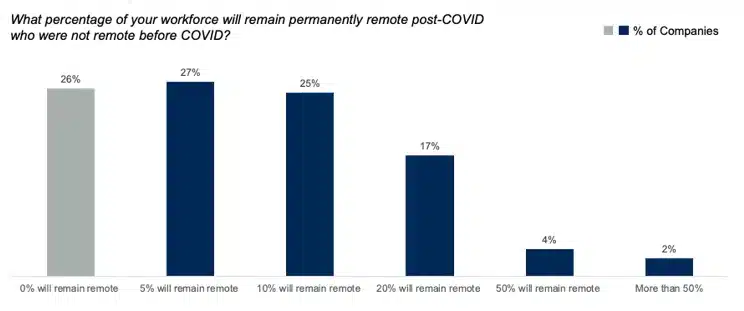Daily standup meetings are a routine part of a manager’s life. They serve as an axis to keep the team well connected and in touch with each other’s role in achieving the common goal.
In the wake of COVID-19 pandemic, the world continues to embrace remote work more and more.
Consequently, a manager has to reinvent her strategies with a remote-friendly approach and find ways to maintain high remote employee engagement.
Some of the biggest problems a manager with remote employees face is eliminating the communication gap and daily standup meetings can be an effective way to deal with it.
A standup meeting can also help a manager in improving remote employee engagement and increasing productivity besides removing barriers to communication.
All you need to do is follow certain tips to ensure that you derive maximum value from the time you spend in your daily standup meetings.
In this article, we set out to explore what exactly is a daily standup meeting, how it can make a difference to your remote team and what you can do to make it more effective and engaging.
So, let’s begin.
What is a daily standup meeting?
In an agile team, a daily standup meeting is where the team gets together every day for a specific time to discuss the daily progress and the plan to be followed.
As the name suggests, people often do not sit down in this meeting to avoid long discussion, stress on the urgency and keep the meeting straight-to-the-point and time-bound.
It is supposed to last for 15 minutes and addresses three main questions
- What has been achieved?
- What remains to be done?
- Are there any issues that are hampering the completion of a task?
Why are daily-standup meetings vital in remote work?
The purpose of a daily standup meeting is to keep everyone on the same page which becomes even more important when you are managing a remote team.
In a regular office scenario, team members can walk up to each other to clear doubts and are aware of the real-time updates which cannot happen in a remote work setup.
Hence, a standup meeting serves as a tool to address issues collectively and improve transparency amongst team members.
A team with remote employees, however, may have members distributed over different geographical locations.
The absence of physical proximity makes communication and coordination more complex with remote employees.
Thus, the role of standup meetings expand and become more essential.
In a remote work environment, standup meetings become a focal point of bringing the whole team together daily and discuss action items, strategies and blockers on a common platform for better synergy.
Mostly, a standup meeting is the only time when the remote employees are present with other team members in the same capacity.
It keeps them in the loop and more connected.
Difference between daily standup and status update meeting
Their difference lies in the question they aim to answer.
In a status update meeting, the main concern is – “How much work has been completed?”
But, in a daily standup meeting, the core theme is – “What is your action plan for the day?”
A status update meeting focuses on the progress of the deliverables whereas a daily standup meeting aims to improve planning and achieve maximum team collaboration.
A status update meeting helps a manager in knowing what an individual employee has completed up to a point of time.
A daily standup meeting, on the other hand, concentrates upon how a team can achieve its goals together and the roadblocks the team is focusing on.
A status update meeting wants to know the results whereas a daily standup meeting aims to understand the future course of action.
Benefits of daily standup meetings for remote employees
Besides the advantages of flexibility and freedom, remote work also ushers in a set of unique challenges.
Lack of coordination and miscommunication happen to be some of the problems that remote employees face.
But, they’re only the tip of the iceberg.
There’re many intricate issues that a remote employee may face which are completely different from that of a regular office-going employee.
A daily standup meeting can help a manager streamline a lot of them. Here’s how –
1 Helps in building team rapport
One of the major challenges of remote work is lack of human connection.
The lack of personal connection and acquaintance may cause major obstacles and hamper interpersonal coordination.
A daily standup meeting allows the entire team to be present at the same time on the same platform even if it’s virtual.
Your remote employees will get a chance to interact with other team members and learn more about them.
2 Removes roadblocks
For a remote employee, their manager is their immediate and often the first point of contact for every issue they may be facing.
Some of the problems can easily be solved with the help of a fellow team member instead of reaching out to you directly.
However, remote employees are not acquainted enough with their teammates and are reluctant to contact them.
A daily standup gives them a chance to get to know the entire team and helps them get familiar with other employees’ personalities and skills.
It also eases their hesitation in approaching others and they may even solve many problems with their team member’s help rather than approaching you for every single issue.
3 Encourages knowledge transfer
Your remote employees work independently and depend upon their knowledge, research and your guidance for learning and execution of their task.
In a shared workspace, team members tend to consult each other and rely on each other’s expertise to get things done.
There will always be an Alex who’s great at excel or a Tina who can make a presentation look better with a few tweaks.
A remote employee might not get the opportunity to know either Alex or Tina without a daily standup meeting.
When every employee shares their issues on a common platform, they may be able to find help or suggestions from another team member.
This exchange will encourage the transfer of valuable information and strengthen your team.
4 Improved coordination
A daily standup meeting will ensure that all your direct reports are aware of the progress and the upcoming action plan.
This way everyone is aware of the responsibilities and there’s no scope of miscommunication or confusion.
Increased transparency and better communication lead to maximum coordination and saving of time.
5 Instill a recognition of shared goals
Often, remote employees become isolated and estranged from the organizational goals.
They know that they’re expected to deliver 5 articles, or deploy the code, or provide 5 designs by the end of the period.
However, they don’t know how it contributes to the company and how it affects the overall process.
In a daily standup mee
ting, they get a complete view of the bigger picture and where they stand in it.
It instils a sense of belonging and helps them realize where they fit in the puzzle.
This knowledge of their work’s importance will boost their morale and will make them feel included.
How can daily stand-up meetings help in remote employee engagement?
Due to the precautions being taken up after the Coronavirus outbreak, the number of remote employees will rise inevitably.
A research by Gartner reveals that 74% of CFOs are planning to shift a considerable number of their employees to remote work permanently.

While this move opens up new avenues to retain and hire diverse talent, it also poses the challenge of re-imagining the strategies to keep remote employees engaged and well-coordinated.
In a traditional workplace, daily standup meetings have been playing the role of channelizing better management among the team.
As a manager, you already know the ropes of conducting these meetings in a way that they are productive, engaging and interesting.
With the shift in workplace dynamics, you will have to accommodate remote employees and ensure that they are well-represented in the meeting.
Here’re a few tips that can help you out.
Tips for productive & engaging daily standup meetings for remote teams
1 Decide a fixed time
The reason why we have a standup meeting is to inculcate a routine of accountability, discipline and concrete planning in our team.
And, this is why you must decide upon a fixed time to conduct it every day.
If you change the time often, it will lead to confusion, delay and late arrival or absence of many employees.
With fixed time, your entire team will become habitual and will embrace it in their daily routine.
Ideally, a daily standup meeting should happen either at the beginning or the end of the day.
A standup meeting at the start of the workday helps in planning the day while the one at the end helps in preparing your employees for what to expect the next day.
In case, your remote employees are working from another timezone, you will need to ensure that they’re comfortable with the time.
Remember, a daily standup meeting will garner positive results only if all your team members are present; including your remote employees.
Pro tip: Send out a calendar invite which includes a link to the virtual meeting and use the same link daily.
This will help all your direct reports in finding the meeting link every day without having to contact you or someone else.
2 Decide upon tech tools
Now that your team has remote employees, you are more likely to conduct the daily standup meeting virtually.
Thus, it becomes important to have the right tech tools for your support.
For a daily standup meeting, you will require the following kind of tools –
- A video conferencing tool like Skype or Google meet
- A task management tool to keep a note of all the action items
- An easy-to-use screen sharing mechanism
Make sure that everyone agrees on the tools decided upon and have no technical difficulties in accessing them.
It’s a good idea to have a trial run with your team including your remote employees before you finalize on the time and the tech tools for your daily standup meeting.
Pro tip: Use an online meeting software that can help you keep track of all the action items, take notes and set reminder for follow-ups.
3 Have a fixed set of questions
A daily standup meeting is a routine get-together for your team where they discuss their action plan.
Having a fixed set of questions saves your discussion from elongating unnecessarily with distraction and surprises.
It also helps your direct reports in prioritizing their tasks and understanding what’s more important at every juncture.
Your daily questions could be as follows –
- How do you feel today?
- What did you work on yesterday?
- What do you plan to do for today?
- Any challenges/roadblocks?
You could also include a few ice-breaker questions in your initial daily standup meetings to help remote employees gel with other team members.
You could ask them to introduce themselves and let each other know about their roles in the team.
ICEBREAKER QUESTIONS EBOOK
Icebreaker questions you can ask in every meeting during the COVID-19 pandemic.
Easy to Implement Virtual Coffee Software for Remote Teams
CoffeeConnect automatically connects two people every week based on their interests in slack and helps them build camaraderie easily with ice-breakers questions and rapid-fire quizzes.
4 Give every team member a chance to speak
The structure of a daily standup meeting requires every team member to be participative.
So, you’re responsible for ensuring that all of your direct reports get ample opportunity to discuss their plans especially the remote employees.

A standup meeting with remote employees will need a different approach.
You may begin in the order with seniority to familiarize new joiners and remote employees with the structure of the meeting.
Or you may even segregate the order based on the roles. For example, the developers begin the meeting followed by the design and the content team.
Moreover, it is important to stick to the same order for a few weeks before reshuffling to avoid confusion at the beginning of every meeting.
5 Keep it short but be flexible
Generally, a standup meeting is time-boxed and is supposed to last for 15-20 minutes.
However, a lot of this time limit depends on the size of your team.
Also, a team with remote employees should have some room for technical issues like connectivity, screen sharing and voice clarity.
However, the golden rule of a standup meeting remains the same in every case – as short as possible.
As you already have a pre-decided set of questions, the discussion will start to become concise after a few initial meetings.
But if there’s any pressing issue that surfaces during the standup meeting with a particular employee, you should decide to take it up after the meeting instead of keeping everyone on the call.
6 Share major updates
If there’s an important announcement or update in a project, try to share it in your daily standup meeting.
Your daily standup meeting will be
come the hub of communication and will have the presence of all of your direct reports including your remote employees.
If you share any updates here, it will reach everyone in your team at the same time and make your remote employees feel included.
Furthermore, it keeps everyone in sync about the events and happenings in the organization and eliminates any chance of missing out.
7 Encourage cross-personal interactions
In a daily standup meeting, your remote employees get a chance to speak to their counterparts at least once in a day.
You can harness this opportunity to encourage discussion within the team and get them acquainted with each other.
Say you have a remote employee Laura who’s facing an issue in preparing reports.
And, you also have another employee Patrick who’s a pro at it.
During the standup meeting, you can set both of them up for a separate call to resolve this problem.
By doing this, you will not just save time but will also help your remote employee in engaging and interacting with the team.
Team building is very important for achieving consensus on important matters in the smooth execution of tasks.
This step of initiating a conversation will improve team coordination drastically and the next time, your employees may even contact each other directly for support.
ICEBREAKER QUESTIONS EBOOK
Icebreaker questions you can ask in every meeting during the COVID-19 pandemic.
Easy to Implement Virtual Coffee Software for Remote Teams
CoffeeConnect automatically connects two people every week based on their interests in slack and helps them build camaraderie easily with ice-breakers questions and rapid-fire quizzes.
8 Keep a note
Documenting the discussion in a daily standup meeting is essential as it serves as a basis of future actions and strategy making.
Ideally, it’s a manager’s responsibility to keep everything noted.
However, you can also assign this task to your remote employees to ensure that they’re engaged in the discussion.

This responsibility will also give them a chance to establish contact with everyone as they will pay attention to everyone’s discussion and send the pointers across.
What happens in a daily standup meeting can become a catalyst to better engagement of remote employees if used properly.
Closing thought
The best way to keep your remote employees engaged is to communicate more and keep them aligned with the common goal.
With a daily standup meeting, you can provide them with an opportunity to converse with the entire team and keep a track of what’s happening in the organization.
As they get daily reports of what their teammates are doing, they will also be able to assess their performance, find solutions to their issues and improve their visibility.
So, before you try out new-age methods to manage your remote employees, you must implement trusted methods like a daily standup meeting.
With the above tips in mind, you will be able to start a collaborative culture and better communication with your remote team.







